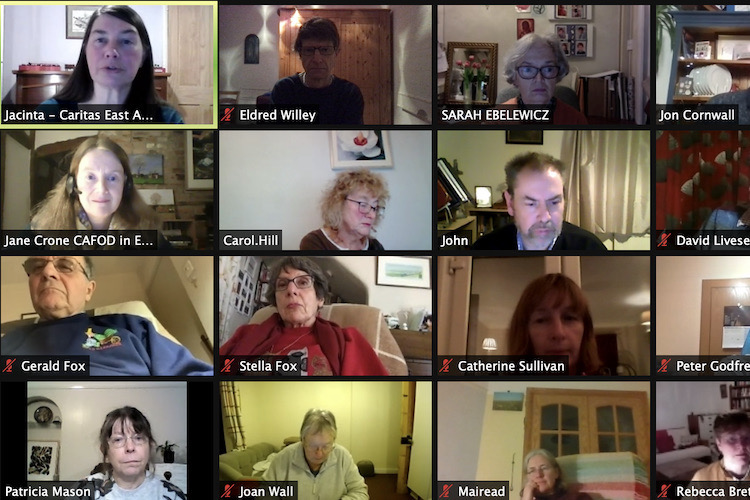
Diocesan vacancy for Historic Churches Support Officer
January 15, 2021
Cambridge Song School keeps young people together
January 18, 2021A Caritas online meeting has provided practical advice about how to launch a social outreach project, especially to support isolated older people.
Caritas Development Worker Jacinta Goode led the meeting, which was joined by some 20 people from around the diocese.
“We are here because lots of people are in need,” said Jacinta. She recalled an earlier webinar which had taken place in November, focussing on ‘The Richness of Many Years of Life’. “Honour your father and mother is the first of the commandments dealing with love of other people,” she said, reminding participants that many older people were feeling isolated at the moment.
Fr John Warrington, Chair the Diocesan Caritas Commission, opened the webinar in prayer. He prayed that we would all be able to reach out with some small act of love to older members of the community.
Jane Crone, Community Participation Coordinator at CAFOD, then gave a reflection on Fratelli Tutti, the October 2020 encyclical by Pope Francis on social friendship.
The Pope wrote that this was ‘a time for bold and renewed hope’. The second chapter of his letter is a meditation on the parable of the Good Samaritan. We make ourselves vulnerable, he says, when we respond to the needs of a stranger. But rather than thinking what will happen to us if we help, we need to think of what will happen to the other person if we don’t help.
Jane then gave a presentation illustrating the message, drawing on a young doctor in Beirut who had volunteered her services after the explosion there last August.
The next speaker was Jon Cornwall, Director of Membership of the St Vincent de Paul Society (SVP). He began with a quotation from St Vincent de Paul himself: “Love is creative to infinity.”
“Last year we were posed one of the biggest obstacles,” he said. “Our ministry could not happen face-to-face.” However, he had found ways around this by suggesting five things people could do every time he had to tell them there was something they couldn’t do.
He describes how he attracts volunteers to this work, not by giving history lessons or by making the work sound easier than it is, but by demonstrating how rewarding it is to meet genuine needs, and by emphasising the truth that “together we can give so much more”.
Jon has discovered that an effective way to get people signed up is to give them a questionnaire which has three options to tick: 1) I am interested and have time 2) I am interested and would like to pray 3) I am not really interested. He has found that most people tick the second option.
SVP, he said, puts the focus on early intervention. It’s a case of “How can we help you before you need food hampers or suicide advice?” Many SVP volunteers were previously beneficiaries, so are very committed to the cause.
Carol Hill from Catholic Care in Leeds then spoke, drawing on 25 years of working for the charity. “No barrier is too big to get around,” she said. She gave examples of how her project had adapted to the pandemic, organising exercises on Zoom and taking hot meals to people rather than inviting them to a lunch.
Carol gave a very useful step-by-step guide on how to set up a new project, in which she emphasised the importance of talking both to the parish priest and to the leaders of existing groups when starting a new initiative. Carol also spoke of the Toolkit which Catholic Care Leeds produced in collaboration with CSAN (the Caritas Social Action Network). The Toolkit contains a huge amount of information about how to set up new projects and can be found here: www.csan.org.uk/embrace-downloads/
Hamish McQueen, Director of Diocesan Youth Services, added some comments about getting younger and older people together. “I’ve never come across an example of it not being fantastic when you get young people involved intergenerationally,” he said. He advised connecting with catechists, leaders of confirmation groups and headteachers so as to link with a ready-made group of young people.
A time of open discussion followed, and Jane Crone came back with a comment on Zoom chat which attracted a lot of interest:
“When I was teaching in a village school, we invited older village members in to share their memories and the children interviewed them. It was fantastic, the children came up with questions and wrote up the results. Once the pandemic is over….”
In terms of funding, Jacinta informed participants that two funds were available in the diocese: the Alive in Faith fund, which is for long-term projects, and the St Edmunds Fund, which is more orientated towards emergencies. She invited people who have an idea which needs funding to contact her on caritas@rcdea.org.uk If you would like to set up a new project you can contact Jacinta for support, or go directly to your parish priest. Parish priests can also provide the necessary forms to request funding from the St Edmund’s Fund and the Alive in Faith Fund.
If you would like help from Caritas in setting up a new project to support the elderly and isolated, or any other social action project, please contact Jacinta: caritas@rcdea.org.uk
Fr John Warrington closed the meeting with a prayer and a poem by Harold Thurman:
The Work of Christmas
When the song of the angels is stilled,
When the star in the sky is gone,
When the kings and the princes are home,
When the shepherds are back with their flocks,
The work of Christmas begins:
To find the lost,
To heal the broken,
To feed the hungry,
To release the prisoner,
To rebuild the nations,
To bring peace among people,
To make music in the heart.




